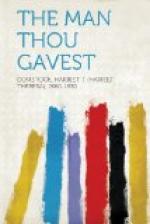“I have a studio to evolve,” Lynda said, passing a slice of toast to Truedale from the electric contrivance before her, “a woman wants a studio, she feels it will be an inspiration. She’s a nice little society woman who is bored to death. She’s written an article or two for a fashion paper and she believes she has discovered herself. I wish I knew what to put in the place. She’d scorn the real thing and I hate to compromise when it comes to such things. And you, Con, what have you that must be done?”
Truedale looked at her earnestly. “I must meet the lawyer and McPherson,” he said, “but may I come—for a talk, Lyn, afterward?”
“I shall be in my workshop all day, Con, until dinner time to-night.”
The day was a hard one for them both, but womanlike Lynda accepted it and came to its close with less show of wear and tear than did Truedale. She was restless and nervous. She worked conscientiously until three and accomplished something in the difficult task the society woman had entrusted her with; then she went to her bedroom and, removing every sign of her craft, donned a pretty house dress and went back to her shop. She meant to give Truedale every legitimate assistance, but she was never prouder or firmer in her life. She called the dogs and the cats in; she set the small tea table by the hearth and lighted just fire enough to take the chill from the room and yet leave it sweet and fresh.
At five there was a tap on the door.
“Just in time, Con, for the tea,” she called and welcomed him in.
To find her so calm, cheerful, and lovely, was something of a shock to Truedale. Had she been in tears, or, had she shown any trace of the suffering he had endured, he would have taken her in his arms and relegated the unfortunate money to the scrap-heap of non-essentials. But the scene upon which he entered had the effect of chilling him and bringing back the displeasing thought of Lynda’s sacrifice.
“Have you had a hard day, Con?”
“Yes.”
“Drink the tea, and—let me see, you like bread and butter, don’t you, instead of cakes?”
They were silent for a moment while they sipped the hot tea. Then, raising their eyes, they looked suddenly at each other.
“Lyn, I cannot do without you!”
She coloured deeply. She knew he did not mean to be selfish—but he was.
“You would be willing even to—accept my sacrifice?” she asked so softly that he did not note the yearning in the tones—the beseeching of him to abdicate the position that, for her, was untenable.
“Anything—anything, Lynda. The day without you has been—hell. We’ll get rid of the money somehow. Now that we both know how little it means, we’ll begin again and—free from Uncle William’s wrong conceptions—Lyn—” He put his cup down and rose quickly.
“Wait!” she whispered, shrinking back into her low armchair and holding him off by her smile of detachment more than by her word of command.




